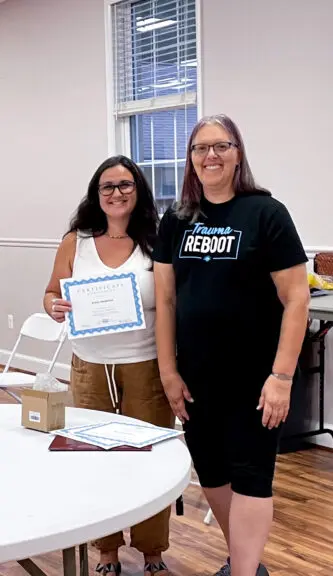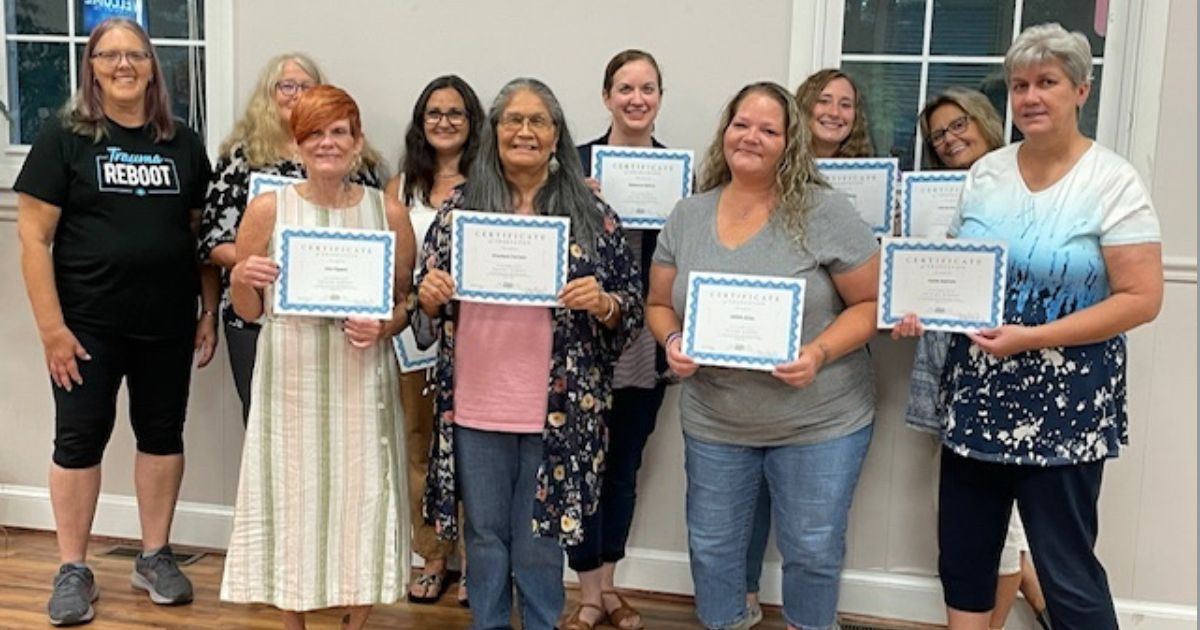By Sharon Mager
HUNTINGTOWN, Md. — Emmanuel Church, Huntingtown, is one of several Maryland/Delaware churches striving to minister to individuals struggling with mental health issues. The church uses Trauma REBOOT, a Christian peer-to-peer program designed to help those dealing with general trauma, and separate courses for military personnel and first responders. Church member Jane Benitz, who leads Hope4Healing Mental Health Ministry at Emmanuel Church with co-leader Kristy Hendricks, encourages program participants. “I tell them they are not irrevocably broken. They can be put back together and have a successful life.” And Benitz knows what she’s talking about. This month, she celebrates her seventh year in recovery, which she calls — “victory over addiction one precious day at a time,” and says she overcame much trauma to live out this blessing of being in recovery.

Kristy Hendricks and Jane Benitz lead Trauma REBOOT at Emmanuel Church. (Photo courtesy of Emmanuel Church).
Previously, Emmanuel Church had a mental health program with a professional counselor and members were getting certified to do mental health coaching through the American Academy of Christian Counselors. However, when the leader had to step down, the group was in a quandary.
“We were left floundering for a bit and praying,” Benitz shares. She started taking a Trauma REBOOT class online to see if it would be helpful and found that she loved it. Lead Pastor Rick Hancock encouraged her to “Go for it!”
Trauma REBOOT t is a 12-week video-driven course with a trauma healing curriculum and lessons guided by a leader who has “lived it.” The Trauma REBOOT website reads, “It’s not a lecture. It’s a conversation. Every participant plays a part in helping one another.” Subjects include surrendering to God, finding safety, managing emotions, grieving well, overcoming guilt, shame, and regret, restoring identity, sharing your story, forgiveness, and finding stability. Hendricks, who led the most recent REBOOT class for the first time, shared, “This course has helped so many, including myself, to find peace and gain clarity. I am honored to have had this opportunity and look forward to leading my next course.”
Hendricks was drawn to the class after experiencing trauma when a friend‘s son died by suicide. “This tragedy affected many, and since then, I have wanted to do something to provide awareness and prevent future tragedies. I want to walk beside individuals and help them develop tools to manage stress and overcome trauma, anxiety, and depression so that they are freed up to be the people God created them to be, equipped with full, joyful, and thriving lives in service to Him.”
“We have seen incredible success with healing. It’s beautiful to watch!” Benitz says excitedly.
A part of the success also came through a dream. Benitz shared that God directed her to a course called ‘Dare to Care: How to Start and Manage a Mental Health Ministry in Your Church or Community ‘ through Light University, which she had completed some time ago but had forgotten about. After reviewing some old notes, she was amazed that the course covered all the nuts and bolts for implementing an entire ministry with peer-led support, including obtaining insurance. It perfectly complements the Trauma REBOOT program and the mental health coaching, shares Benitz.
Another vital aspect of the mental health ministry at Emmanuel Church is that it blends with their thriving Celebrate Recovery (CR) program, led by Associate Pastor and Maryland CR Director Marc Bartholomew. “Emmanuel is a recovery church,” says Benitz, who has and is part of CR and says it has been a tremendous help to her and many others. Many participants have made professions of faith, are being discipled, and are stepping out as leaders in the church — as she did. “The two ministries overlap beautifully, says Benitz. “At the end of the CR step studies, it is a great time to take a Trauma REBOOT course.”
The church has had five REBOOT sessions with thirty graduates. Their last graduation was on June 3. “Alumni graduates came and shared this time. It was quite a night,” says Benitz with a smile.
The last REBOOT group enjoyed the sessions so much that they asked to fill two full hours every Monday night and to continue for an additional week. An elders meeting was rescheduled to accommodate the group for the extra week. “This is how we define success: people want more time to talk,” shares Benitz.
Both women acknowledge that sharing, listening, and knowing others are facing similar situations is healing. “It resonates with other people,” says Hendricks. In addition to the REBOOT sessions, the discussions continue later into the evening. Benitz noted that a lot of growth happens through “parking lot conversations” and the relationships built along the way.
Hendricks says, “I grew up in a time where there was a lot of stigma attached to needing help and having problems. People just hid it or pretended it wasn’t there, and that’s not the answer. I’m glad people are becoming more vulnerable, sharing more, and asking for help.”
People are hungry and want and need relationships.
The next session will begin in late summer.

